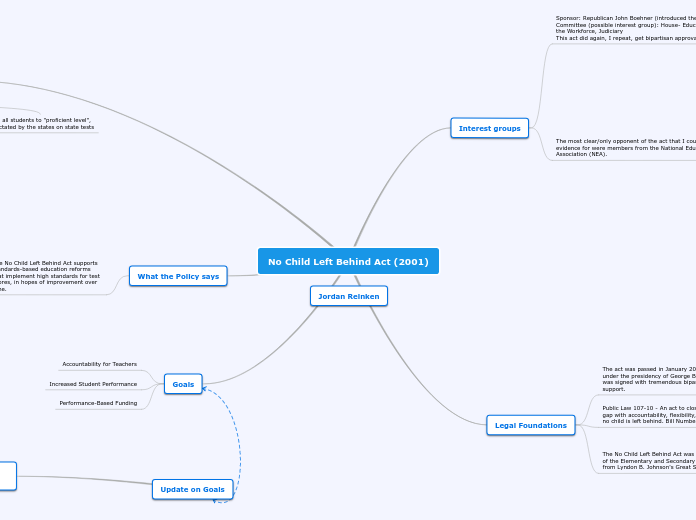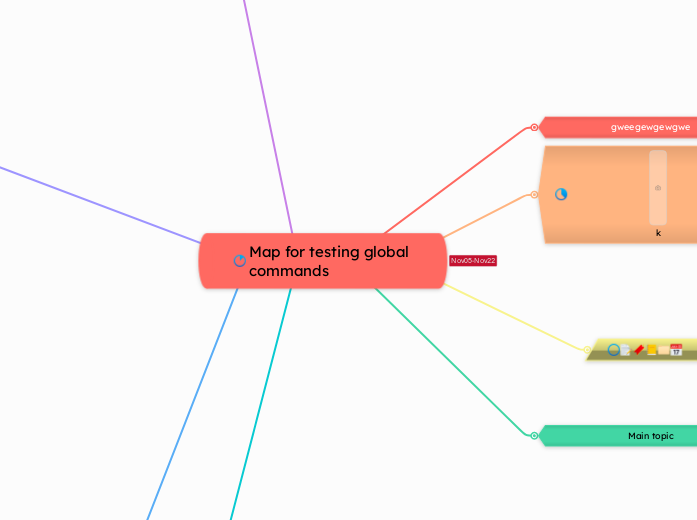Update on Goals
Obama Signs New Law that Nullifies NCLB Act, 2015.
Needless to say, Obama placed the Every Student Succeeds Act back in December of 2015.
Allowed states to adapt to the
Common Core standards of
more common day education
Left accountability goals
almost completely up to the
states
ak
Allowed for emphasis not
just solely on standardized
testing, which was good
because learning is not
'one-size-fits-all'
The ESEA act allows more flexibility
for students and schools by breaking
down assessments into smaller chunks
Jordan Reinken
No Child Left Behind Act (2001)
Goals
Performance-Based Funding
Increased Student Performance
Accountability for Teachers
What the Policy says
The No Child Left Behind Act supports
standards-based education reforms
that implement high standards for test
scores, in hopes of improvement over
time.
An extension of this law includes the
Adequate Yearly Progress (AYP), which
states that 5th graders must achieve
test scores higher than the 5th graders
the precious year.
Legal Foundations
The No Child Left Behind Act was a continuation
of the Elementary and Secondary Education Act (ESEA)
from Lyndon B. Johnson's Great Society Program of 1965.
ESEA rules are designed to help define federal
government's role in K-12 education.
States did not have to comply with the NCLB act but
did risk losing federal funding for Title 1.
Public Law 107-10 - An act to close the achievement
gap with accountability, flexibility, and choice, so that
no child is left behind. Bill Number: H.R. 1.
The act was passed in January 2002
under the presidency of George Bush and
was signed with tremendous bipartisan
support.
Interest groups
The most clear/only opponent of the act that I could find evidence for were members from the National Education Association (NEA).
The NEA argued that the NCLB act requires stringent accountability, but doesn't allow for adequate funding to meet requirements. The NEA views the act more of a punishment than providing the necessary assistance.
Criticism of the NCLB
NCLB act places too much emphasis
on standardized testing and teaching
qualifications
I can really speak to this one because my mom used to be an elementary school teacher and I remember her stress and worry anytime there was to be a teacher evaluation/class sit in. It was such a 'pony show'. I am a firm believer in letting the teacher do there job, that's what they were hired for in the first place.
NCLB act resulted in unfunded
federal mandates
NCLB act causes the federal gov to
be too involved with state domain
Sponsor: Republican John Boehner (introduced the law in 01)
Committee (possible interest group): House- Education and the Workforce, Judiciary
This act did again, I repeat, get bipartisan approval.
What States Have to do to Comply
bring all students to "proficient level",
as dictated by the states on state tests
keep on track for their
"adequate yearly progress" (AYP)
or else consequences will
partake.
Consequences for
Schools
Missing 3+ in a row:
loss of funding, possible school
closing, implement of significant
turnaround strategy
Missing AYP 3 yr in row:
must offer free tutoring
Missing AYP 2 yr in a row:
must allow students to transfer
to a better performing school
wishing the same district









